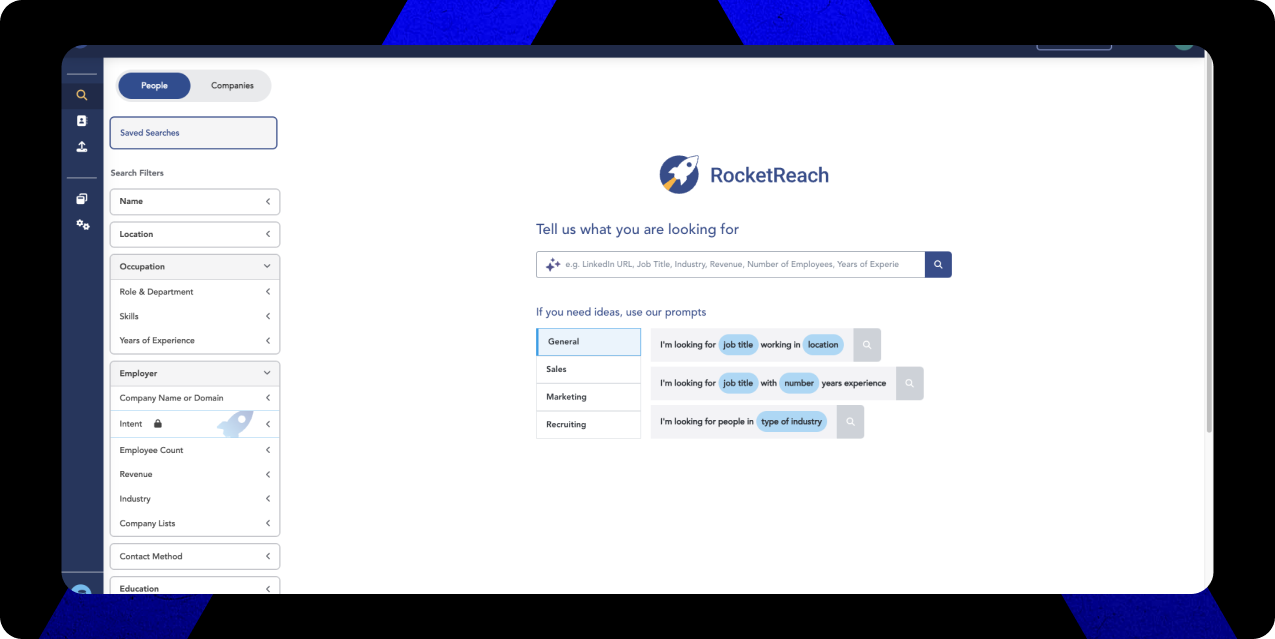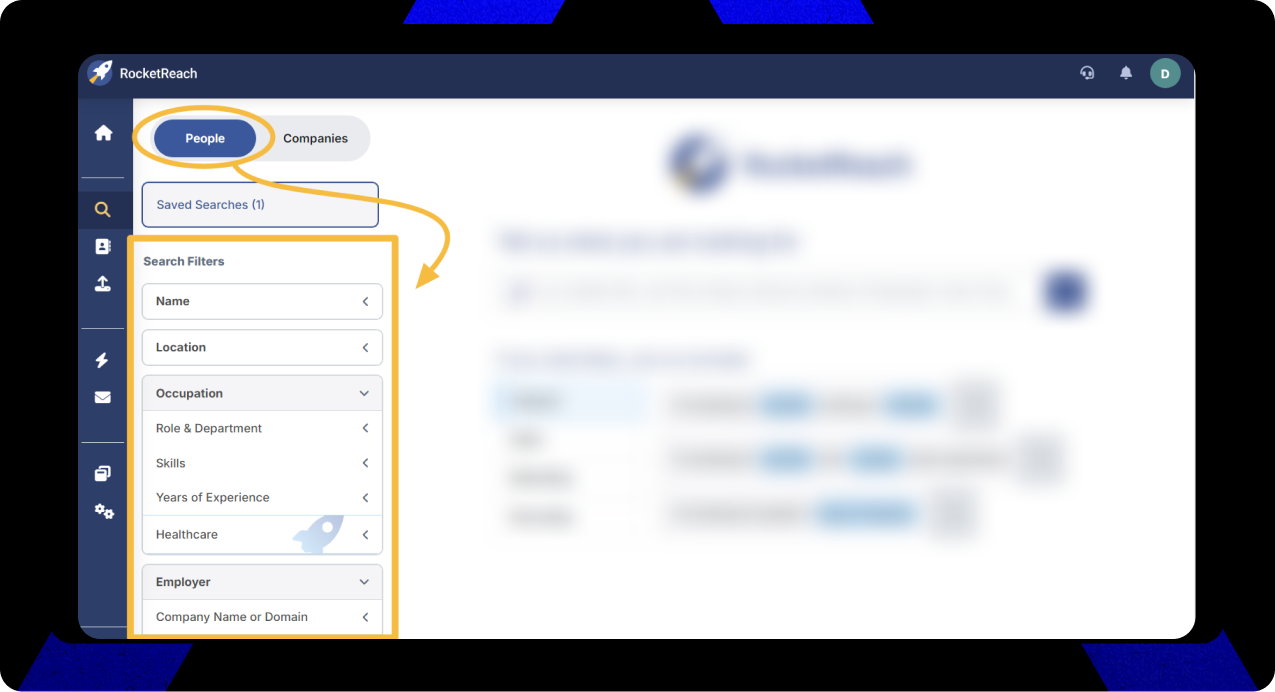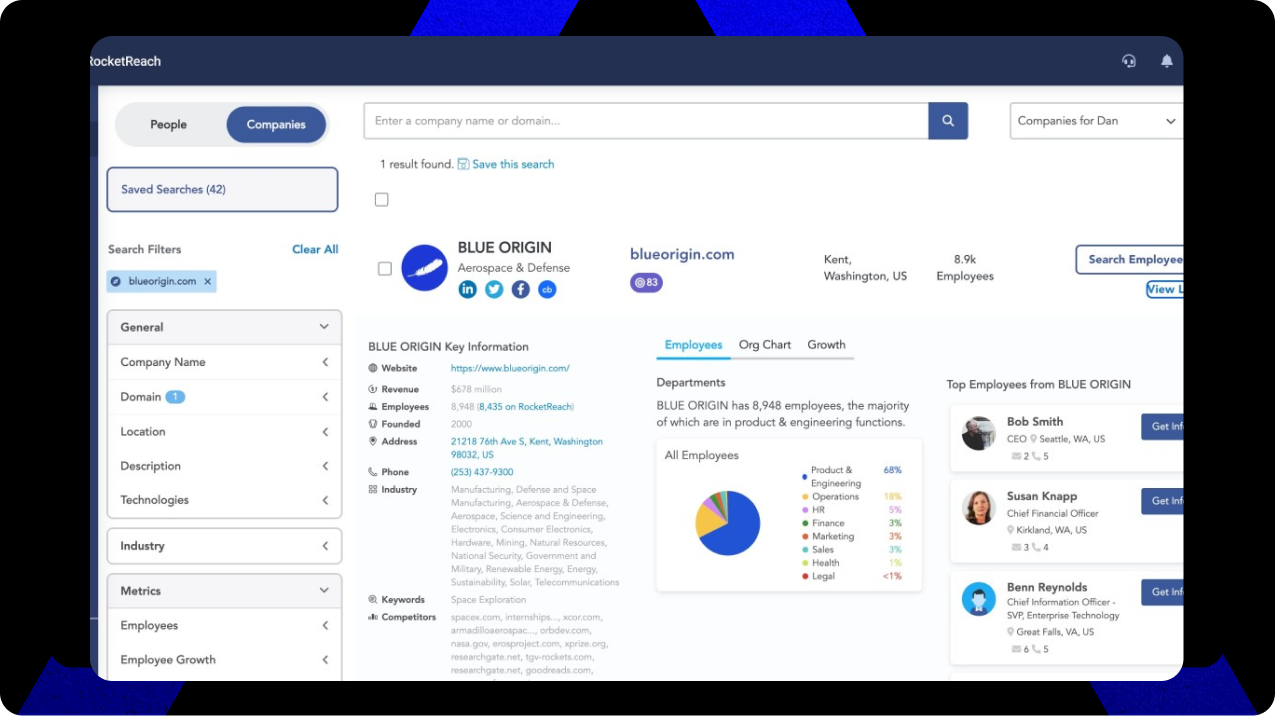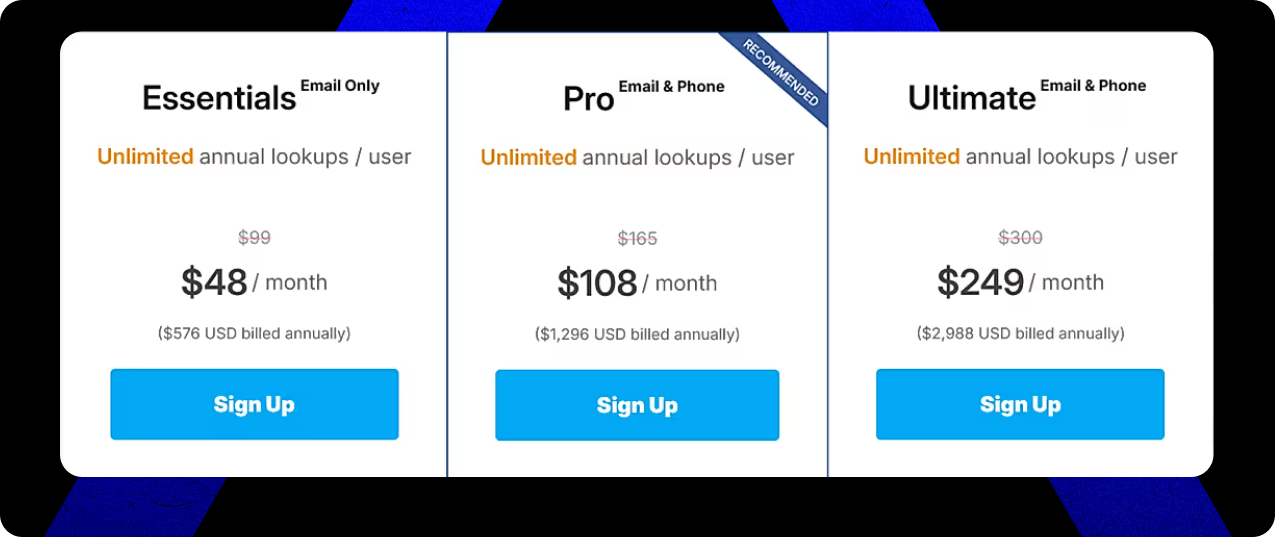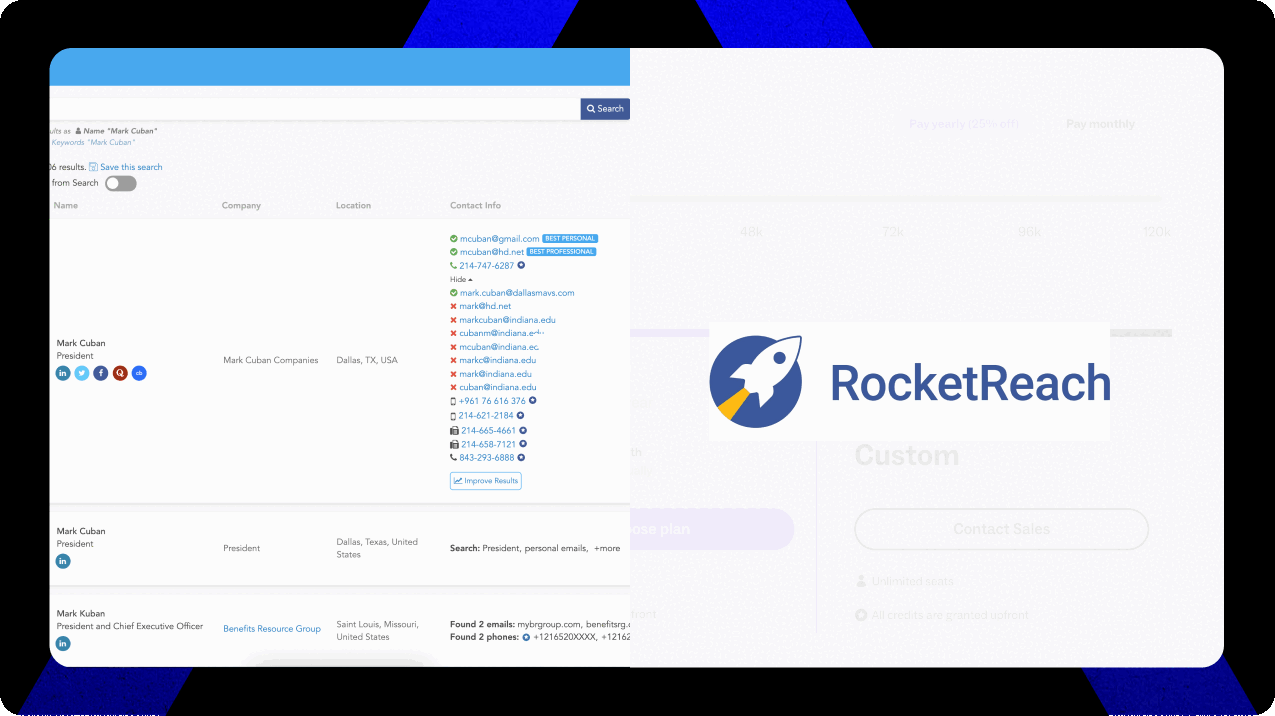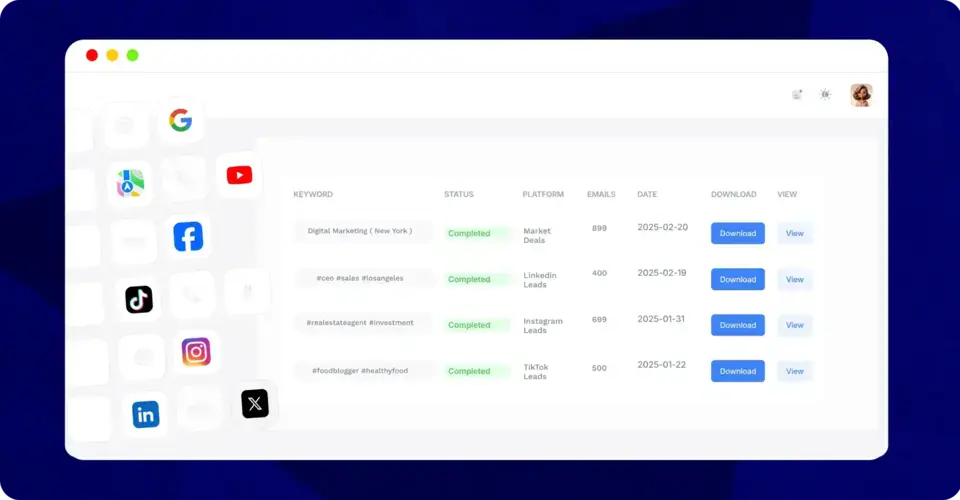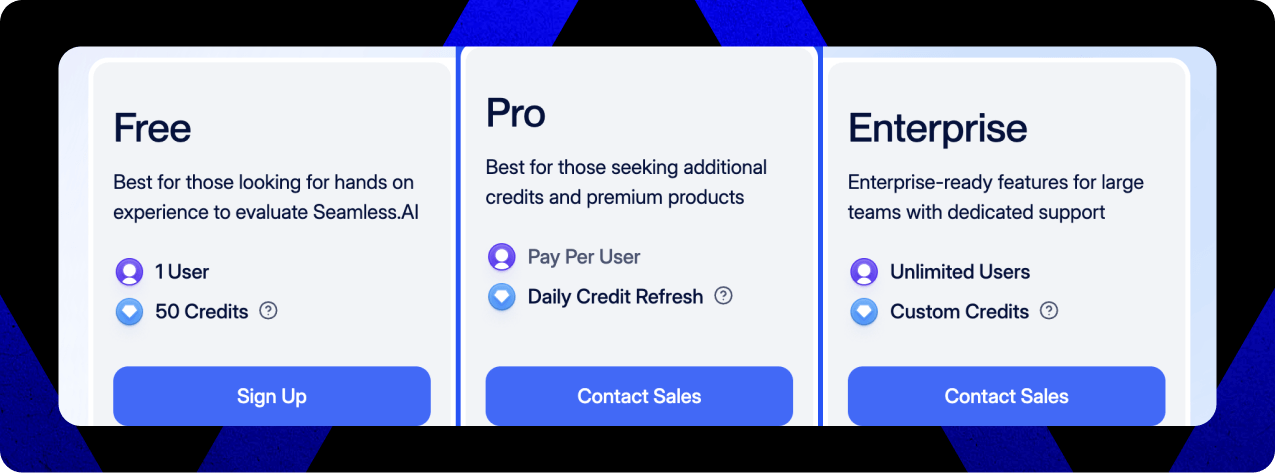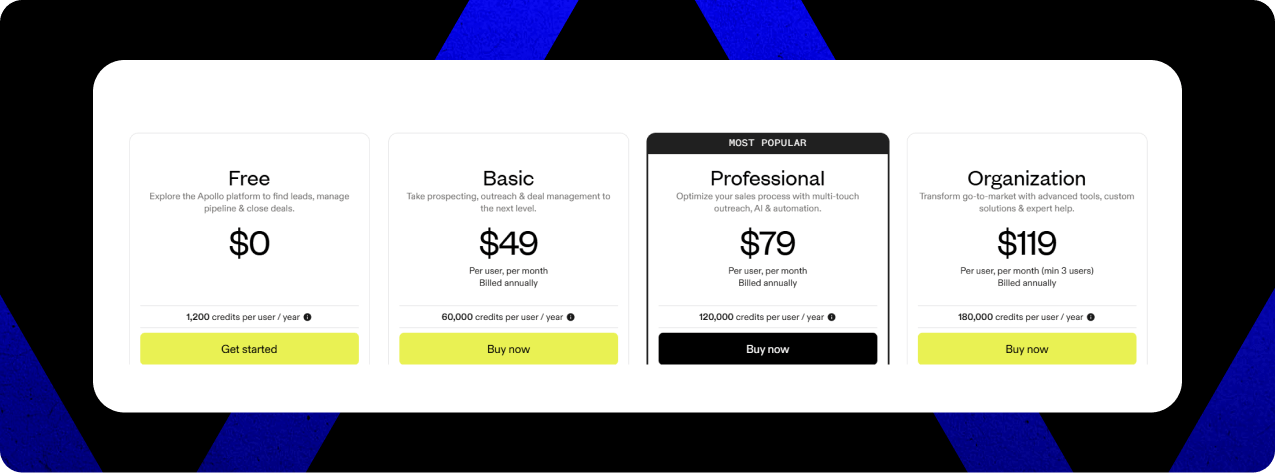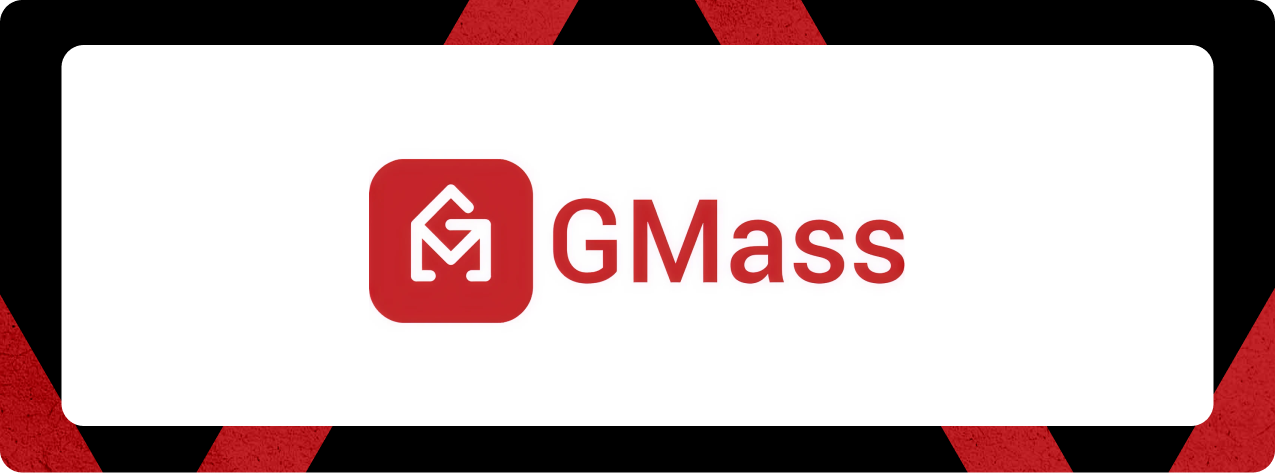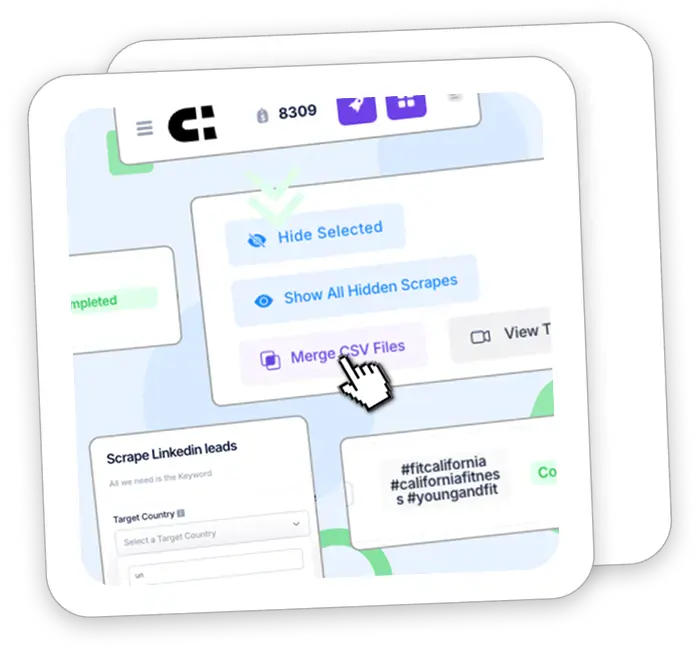The 2025 Rocketreach Review: What You Need to Know Before You Buy

RocketReach has quietly carved out a strong presence in the B2B data world, boasting over 700 million professional profiles and growing its enterprise integrations steadily over the last few years. But as competition intensifies from platforms like Apollo.io, ZoomInfo, and newer scrapers like IGLeads, is RocketReach still worth your money in 2025? Or is it falling behind more modern, niche solutions?
Pros:
- Massive global contact database
- Straightforward UI with easy enrichment workflows
- Strong email verification
Cons:
- Limited outreach automation
- No multichannel sequencing
- Weak CRM integration depth
Our rating:
- Contact database ⭐⭐⭐⭐
- CRM integration ⭐⭐
- Email automation ⭐
- Verification tool ⭐⭐⭐⭐
- Linkedin capabilities ⭐
- Intent data ⭐⭐
- Chrome extension ⭐⭐
- Reporting ⭐⭐
This isn’t another surface-level review packed with screenshots and marketing hype. We’re digging into actual performance data, comparing RocketReach against several leading RocketReach competitors, and breaking down whether there’s a smarter RocketReach alternative for your 2025 sales prospecting strategy.
Rocketreach under the microscope: Is it built for modern sales?
RocketReach keeps things pretty simple. It helps you find verified emails, fill in some missing details on leads, and grab basic company info, nothing too fancy. The global database is solid, so it works well for teams doing B2B lead gen. But compared to a lot of other lead generation tools out there, RocketReach can feel a bit basic. You’re not getting much automation, no real sequencing, and CRM integrations are pretty limited.
If you just want a quick and easy way to find emails, RocketReach gets the job done. But if you’re running bigger outbound campaigns and need more automation or flexibility, a lot of people start exploring RocketReach alternatives that can handle more serious outreach.
Core features of Rocketreach
Extensive contact database ⭐⭐⭐⭐
One of the main reasons people end up trying RocketReach is for its huge database. We’re talking over 700 million contacts and 35 million companies worldwide, which puts it right up there with some of the bigger lead enrichment platforms on the market. If you’re doing B2B lead generation and need to build a list fast, RocketReach definitely gives you plenty of data to work with.
When you start searching, you can narrow down leads by things like job title, company size, industry, location, or even specific keywords and skills. You can also search directly by company domain if you’re targeting specific accounts. It’s pretty straightforward, and you don’t need to be some kind of data wizard to figure it out.
One thing RocketReach does well is international coverage. While some tools mostly focus on US data, RocketReach gives you a broader pool globally, which can be super helpful depending on your market. That said, no email finder tool is perfect. Even with RocketReach’s strong database, you’ll still run into bounce rates, especially depending on the niche you’re targeting. Most users report bounce rates somewhere between 10% and 20% — so it’s solid, but not flawless.
Enrichment & verification ⭐⭐⭐⭐
RocketReach also does a pretty good job when it comes to data enrichment and verification. If you’ve got a list with missing pieces, like partial names, job titles, or missing email addresses, RocketReach can help fill in the blanks. You can upload your CSV files, pull info directly from LinkedIn profiles using their Chrome Extension, or connect limited integrations with certain CRMs.
The email verification itself is one of RocketReach’s stronger points. It tends to outperform some of the cheaper lead generation software when it comes to making sure emails are actually valid. That’s good news if you care about your deliverability (which you definitely should). The only catch? You’re working on a credit system, so the more enrichment you do, the faster you burn through your credits, and those costs can add up quickly if you’re running bigger outbound campaigns.
Chrome extension ⭐⭐
Now let’s talk about the Chrome Extension on RocketReach, which honestly feels a bit dated compared to what a lot of other lead gen tools are doing these days. The RocketReach extension lets you manually look up data while you’re on LinkedIn or browsing company websites. You can grab emails, phone numbers (when available), and some basic company info.
But here’s the problem: there’s no real automation built in. Unlike tools like IGLeads, Clay, or Apollo.io, you can’t bulk scrape search results or automate multistep LinkedIn workflows. Everything has to be done manually, one profile at a time. And if you’re planning to scale up LinkedIn prospecting, this manual approach gets old fast. That’s why a lot of power users eventually start looking for RocketReach alternatives that offer stronger Chrome automation and more hands-off scraping.
CRM integration ⭐⭐
RocketReach does offer some CRM integrations, but honestly, they’re pretty limited. You can connect to Salesforce, HubSpot, or use Zapier to move data around, but compared to bigger B2B lead generation software like Apollo.io, it’s missing a lot of depth.
You won’t get advanced field mapping or custom triggers, and most of the time you’ll end up just exporting CSV files and uploading them manually. If you’re trying to build a more advanced outbound workflow where your CRM automatically updates with fresh leads and enrichment data, RocketReach can feel a bit clunky. That’s usually when people start exploring RocketReach competitors that handle CRM syncing a lot more smoothly.
Email automation ⭐
Here’s where RocketReach really falls behind. There’s basically no built-in email automation at all. No sequencing, no follow-ups, no multichannel cadences: none of it. Once you find your leads, you’ll need to bring those into a separate email platform if you want to actually start contacting people.
Most teams end up using external email finder tools or lead generation software like Instantly.ai, Smartlead.ai, Woodpecker, or Lemlist to actually run their cold email outreach. So while RocketReach helps you build the list, it doesn’t help you much with sending.
Intent data ⭐⭐
If you’re hoping for strong buying intent signals, you might be disappointed here too. Compared to enterprise-level lead enrichment platforms like ZoomInfo or Apollo.io, RocketReach’s intent data offering is super light. On higher-tier plans you might get some basic firmographic triggers or company funding data, but that’s about it. There’s no real behavioral tracking or buying-stage intelligence built in, which for some sales teams can be a deal-breaker if you’re trying to prioritize hotter leads.
Reporting & analytics ⭐⭐
Finally, reporting and analytics are pretty bare bones. RocketReach mostly just shows you how many credits you’ve used, your search history, and whether your enrichments were successful or not. If you’re managing a team and want to track reply rates, email engagement, or sequence performance, RocketReach won’t give you any of that. Other websites like RocketReach that offer stronger reporting tend to be a much better fit for serious outbound teams who want to optimize their sales funnels.
How to sign up for Rocketreach
Getting started with RocketReach is quick and super straightforward. Here’s exactly how to set up your account:
- Go to RocketReach.co and click on “Start for Free.”
- Create your account using either your work email or your Google account. (Tip: using a business email usually gives you better search results. Avoid personal Gmail if possible.)
- Once you’re in, you’ll get a few free search credits to test the platform.
- When you hit the free credit limit, which happens fast, you can upgrade to a paid plan depending on how many searches or enrichments you need.
- You don’t need to connect your email or CRM to start using RocketReach, but if you want to sync data later, you can integrate with Salesforce, HubSpot, or Zapier.
That’s it. No complicated setup, and you can start pulling verified contacts almost immediately.
How much does rocketreach actually cost? Full pricing breakdown
RocketReach pricing is credit-based and scales depending on how many lookups or enrichments you need each month. While you can test it out for free, most users hit the credit wall pretty fast once they start running real searches.
RocketReach pricing explained and costs breakdown in 2025:
- Free Plan: 5 free lookups to test the platform. Not enough for serious prospecting.
- Essentials Plan: Around $27/month for 80 lookups per month.
- Pro Plan: Around $74/month for 200 lookups monthly.
- Ultimate Plan: Around $199/month with approximately 833 lookups per month.
- Enterprise Plan: Custom pricing for large teams with high-volume needs.
RocketReach pricing is simple at first glance but can get expensive quickly. Every email lookup or enrichment burns a credit. The more you prospect, the faster you run into upgrade prompts or overages. Plus, you’ll often need to pair RocketReach with separate email outreach tools, adding even more cost to your stack.
IGLeads pricing overview
Compared to RocketReach, IGLeads pricing is way more predictable, flat, and built for scaling fast.
- Monthly Plans: Start at $49/month for full access to all scrapers with limited exports.
- Unlimited Plan: $249/month for unlimited scrapes, downloads, and exports.
- Annual Plans: As low as $39/month when billed yearly.
With IGLeads, you’re not paying per lookup or credit — you can scrape as many leads as you want from platforms like Instagram, LinkedIn, Google Maps, and YouTube. No credit caps. No hidden upgrade fees. For teams that want flexibility, hyper-targeted lists, or just don’t want to deal with pay-per-credit models, IGLeads offers way more breathing room compared to RocketReach.
What real users say about Rocketreach in 2025
When it comes to picking lead generation tools, real user feedback often tells you way more than polished sales pages. So what are people actually saying about RocketReach in 2025? We dug into reviews across platforms like G2, Trustpilot, Reddit, and user forums to get the full picture, for better or for worse.
Just like with any sales tool, experiences vary depending on your use case. Small teams doing light prospecting tend to be pretty happy with RocketReach’s ease of use and email verification quality. But for bigger outbound teams running high-volume outreach, some of RocketReach’s limitations start to show, especially when it comes to automation, CRM syncing, and the credit-based pricing model.
Here’s a quick summary of what people are saying:
| Pros | Cons |
|---|---|
| ✅ Accurate verified emails | ⚠️ Limited automation features |
| ✅ Simple and clean UI | ⚠️ Expensive at higher volumes |
| ✅ Decent international coverage | ⚠️ No built-in email sequencing |
| ✅ Easy to get started | ⚠️ Basic CRM integrations |
| ✅ Reliable for light prospecting | ⚠️ Credit system limits scaling |
According to Trustpilot, RocketReach currently has a score of 1.2 out of 5, based on hundreds of customer reviews. The most common complaints center around the pricing structure, credit limitations, and the lack of more advanced automation features. On Reddit, you’ll find a mix of users. Some appreciate RocketReach for its simplicity and clean email verification, while others point out that it can’t really handle full-scale outbound workflows without stacking it with other tools.
On G2, RocketReach does score higher, with a rating of 4.6/5 from thousands of users. Many reviewers there highlight how helpful RocketReach is for quick prospect research and one-off lead lookups, but again, bigger teams often feel limited by the lack of multichannel capabilities.
Hudson P, consultant, shared the following:
“A decent market intelligence tool”
Nathanie Rosa, from the United Kingdom, had a bad experience with Rocketreach:
“Untenable recent price hike. Wouldn’t refund my subscription even when cancelled three months ago. A shocking company. Avoid.”
Shied Sharazi, from Pakistan, has a totally different opinion:
“I found this app is very useful like yellow pappers. The accuracy of results are 100 percent. App could not show pictures somtime may b due too poor internet. But in my personall opinion this is a best profile search app. Thanks RocketReach.”
As always, it’s smart to look at a mix of reviews before pulling the trigger, and if you’re running full outbound campaigns, it’s definitely worth comparing RocketReach against some of the stronger alternatives built for high-volume prospecting.
How does rocketreach compare to IGLeads?
Reading RocketReach reviews only gives you part of the picture. Once you’re actually building outbound workflows and trying to scale lead generation, it becomes clear how RocketReach stacks up against newer, more flexible competitors like IGLeads.
While RocketReach has carved out a space as one of the more user-friendly email finder tools with solid data accuracy, it’s still pretty limited once you move beyond simple prospect research. IGLeads.io, on the other hand, takes a very different approach.
IGLeads has become the go-to tool for solopreneurs, digital marketers, growth agencies, and lean outbound teams that need fresh leads quickly without being locked into a credit system or forced into expensive contracts. The difference isn’t just in features. It’s in how you work. RocketReach helps you search, but IGLeads helps you move.
IGLeads features and benefits
IGLeads is built for modern outbound prospecting and lets you pull leads from places RocketReach doesn’t cover, including:
- Instagram (search by keyword, hashtag, or location)
- LinkedIn (full profiles, search results, Sales Navigator support)
- Google Maps (local businesses with verified contact info)
- YouTube (creators filtered by niche or video topics)
There’s no complicated setup or integrations required. You simply pick your filters, run your scrape, and download your leads instantly. No credits, no restrictions, and no waiting.
You also get:
- Extract emails directly from scraped profiles
- Scrape All you want on the Unlimited plan
- Real-time filters for bio keywords, follower counts, niche targeting, and locations
- Easy CSV exports for uploading into your favorite cold email tools or CRMs
It’s built for teams running highly-targeted outreach, whether that’s B2B, influencer marketing, local lead generation, or e-commerce campaigns.
How IGLeads complements Rocketreach
The truth is, some teams use both tools.
RocketReach works well for quick email lookups when you’re researching known companies or decision-makers. But when you want to:
- Test out new audiences fast
- Scrape leads directly from social platforms
- Target local businesses or niche creators
- Avoid worrying about credit limits
That’s where IGLeads gives you more freedom. Think real estate agents on Instagram, dentists on Google Maps, or niche YouTubers that RocketReach simply doesn’t have in its database.
While RocketReach’s pricing model locks you into credits and upgrade tiers, IGLeads lets you scrape freely for one flat monthly price: no contracts, no upsells, and no complicated onboarding.
Rocketreach vs IGLeads: side-by-side comparison
| Feature | RocketReach | IGLeads |
|---|---|---|
| Scraping LinkedIn | ⚠️ Manual extension | ✅ Automated scraping |
| Scraping Instagram | ❌ | ✅ |
| Scraping Google Maps | ❌ | ✅ |
| Pricing Simplicity | ⚠️ Credit-based | ✅ Flat-rate unlimited |
| Lead Export Limits | ⚠️ Limited by credits | ✅ No Limits (on Unlimited plan) |
| Built for Niche Segments | ⚠️ Limited | ✅ Fully flexible |
| Real-Time Filtering | ⚠️ Basic | ✅ Advanced filters |
| Chrome Extensions | ✅ (Manual) | ✅ (Fully automated scrape) |
For fast-moving teams who want complete control over who they target and where they pull their leads from, IGLeads gives you more flexibility, more channels, and none of the credit system headaches.
RocketReach might still work fine if you just need simple email lookups. But if you’re looking for scalable, real-time lead generation across multiple platforms, IGLeads is often the better choice for 2025 outbound prospecting.
Is Rocketreach really the best fit for your lead generation?
If you just need a simple tool to quickly look up verified emails, RocketReach can do the job. For small teams, researchers, or solo founders who want an easy way to pull contact info without dealing with a complicated setup, RocketReach feels very user-friendly and gets you decent data fast.
But once you start running larger outbound campaigns, RocketReach starts to show its limits. There’s no built-in email automation, no multichannel sequencing, and very limited CRM integration. The credit-based pricing model also becomes a headache as you scale. The more you prospect, the faster you burn through your credits (and budget).
Bottom line: RocketReach is great for light prospecting and one-off research, but not built for serious outbound teams that need automation, flexibility, and real volume. If you’re looking for more control, faster workflows, and less pricing friction, tools like IGLeads may give you a lot more room to scale your lead gen without the limitations.
Related to rocketreach
- RocketReach vs ZoomInfo: Which One Is Better for Small Sales Teams?
- 16 RocketReach Alternatives Worth Trying in 2025
- RocketReach Pricing : Is It Worth It In 2025?
- RocketReach Chrome Extension: Setup, How to use and Alternatives
Frequently Asked Questions
RocketReach offers a free plan, but it’s very limited. You get 5 free lookups to test the platform, but you’ll quickly need to upgrade to a paid plan if you want to run real lead generation at any scale.
RocketReach generally offers good email verification accuracy, often landing between 80%–90% for verified emails. However, phone numbers and company data may not always be up to date, especially for smaller businesses or niche industries.
No. RocketReach doesn’t offer any built-in email sequencing, multichannel outreach, or follow-up automation. Most users need to pair it with external email outreach tools like Instantly, Lemlist, or Smartlead for full outbound campaigns.
Some of the most popular RocketReach alternatives include IGLeads.io, Apollo.io, ZoomInfo, Clay, and Seamless.ai. Each offers different features depending on your prospecting needs, automation, and budget.
RocketReach works well for simple B2B lead lookups and smaller prospecting needs. But for larger outbound sales teams that need automation, flexible scraping, and high-volume lead generation, credit-based platforms like RocketReach can feel limiting compared to tools like IGLeads.
